Unit 3 Could you please tell me where the restrooms are第五课时SectionB(2a~2d)课件(共32张PPT)
文档属性
| 名称 | Unit 3 Could you please tell me where the restrooms are第五课时SectionB(2a~2d)课件(共32张PPT) | 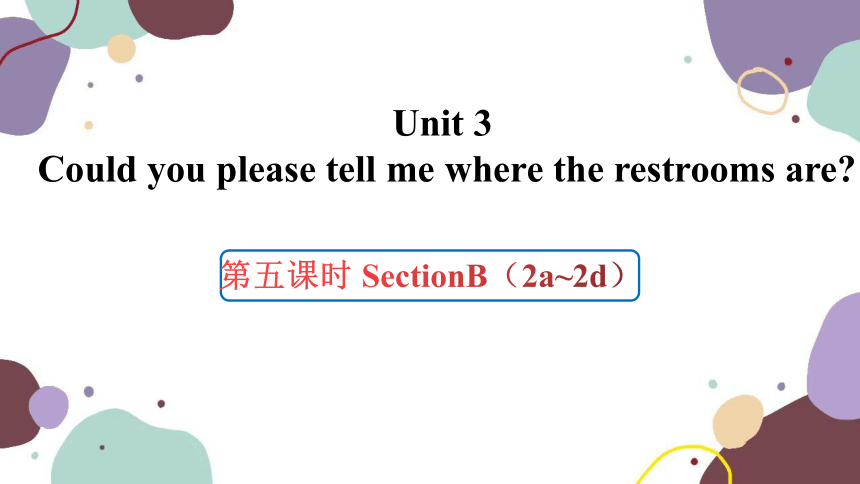 | |
| 格式 | pptx | ||
| 文件大小 | 5.1MB | ||
| 资源类型 | 教案 | ||
| 版本资源 | 人教新目标(Go for it)版 | ||
| 科目 | 英语 | ||
| 更新时间 | 2023-07-07 16:56:32 | ||
图片预览

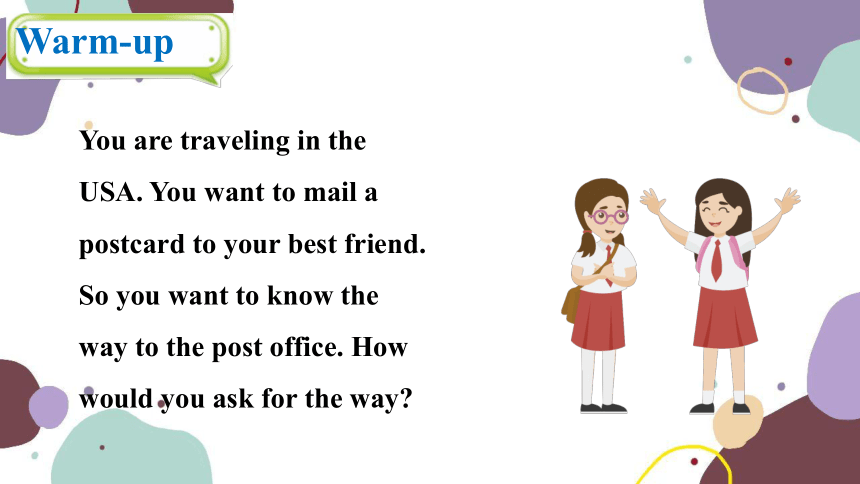
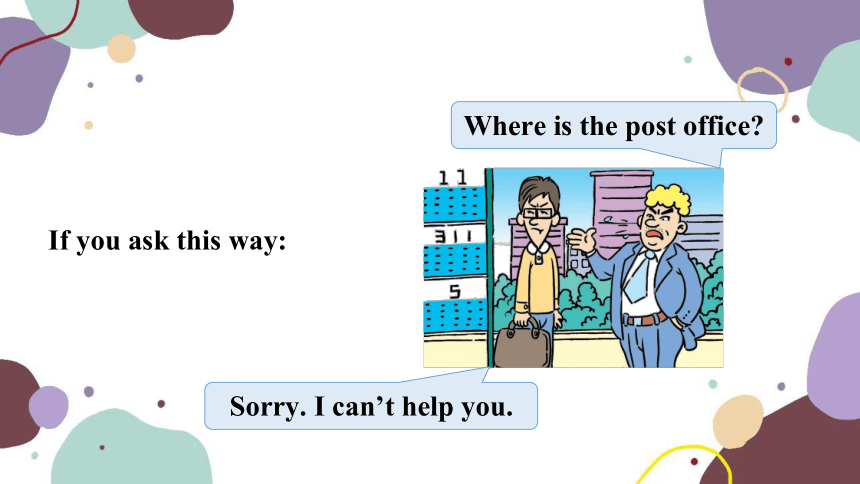
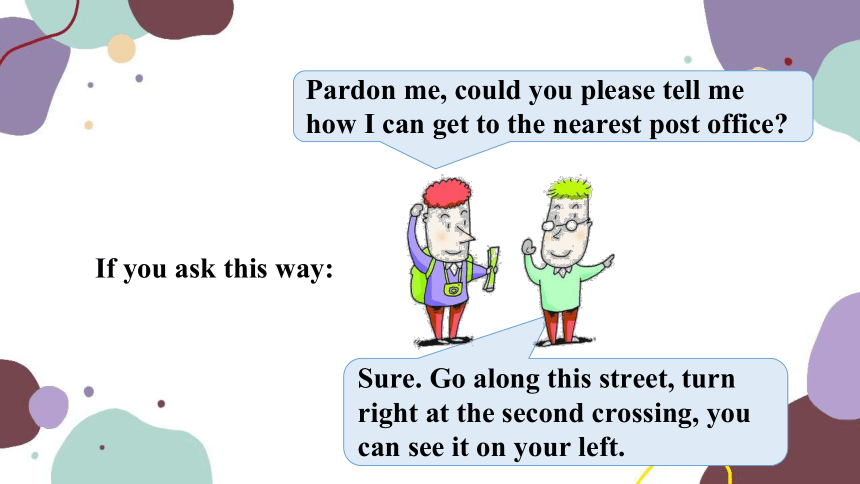
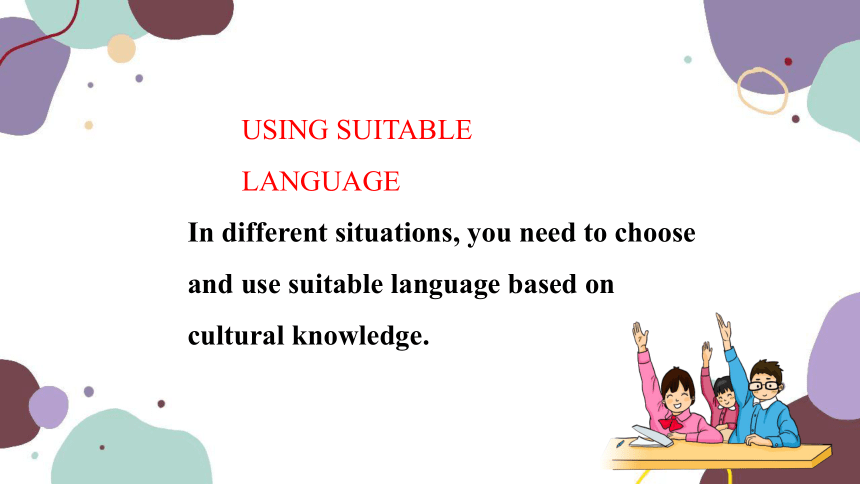
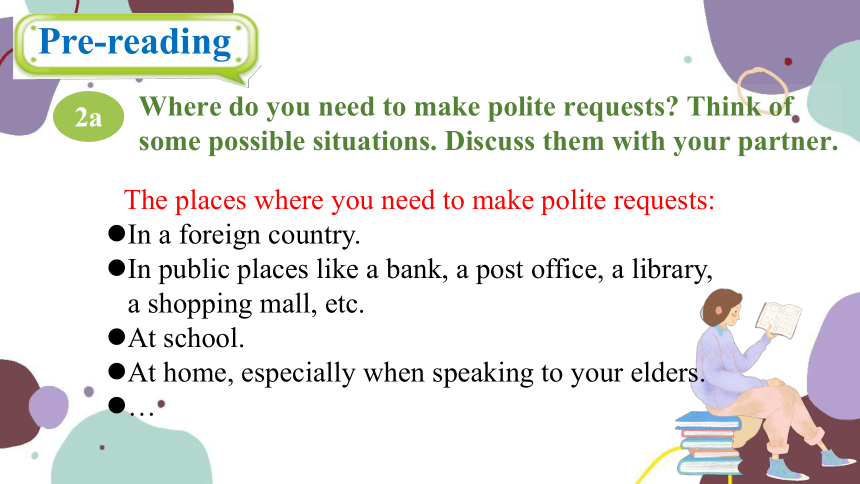
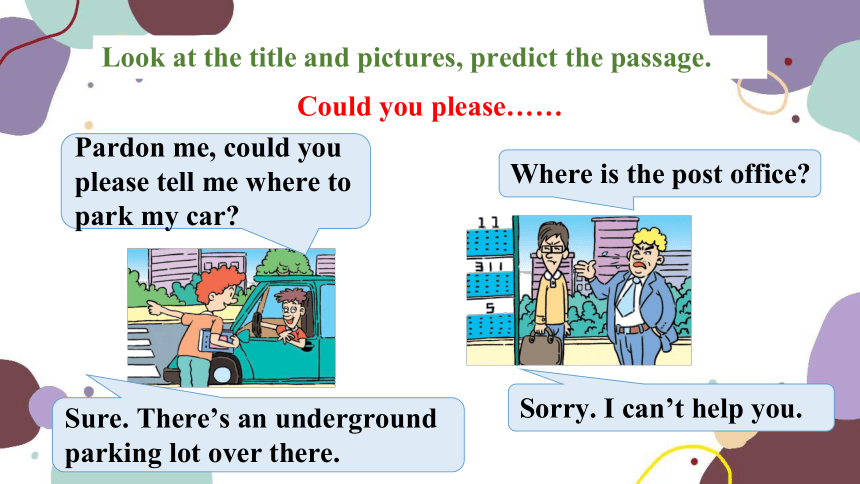
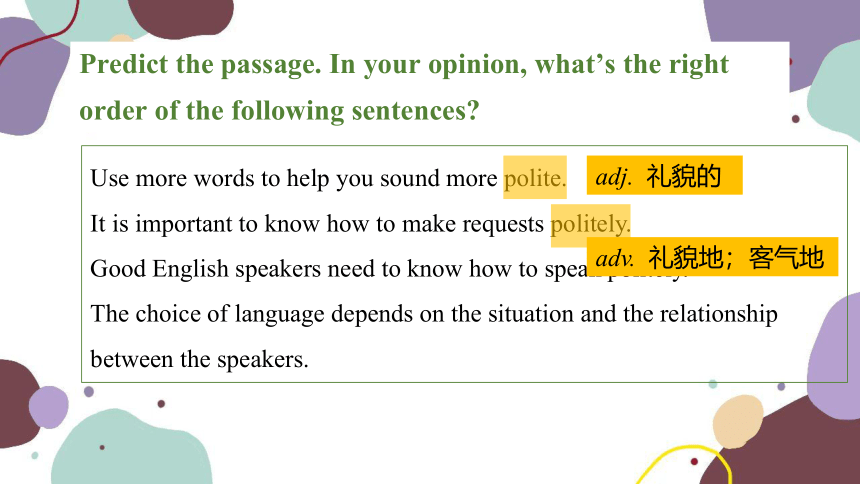
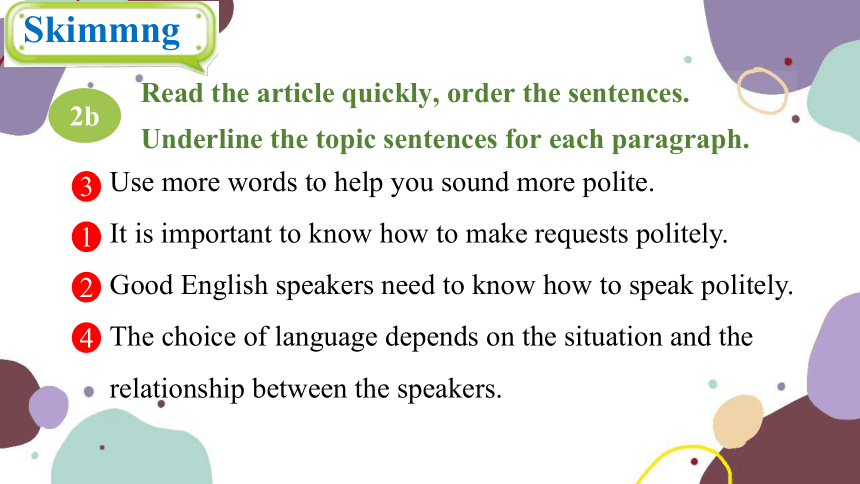
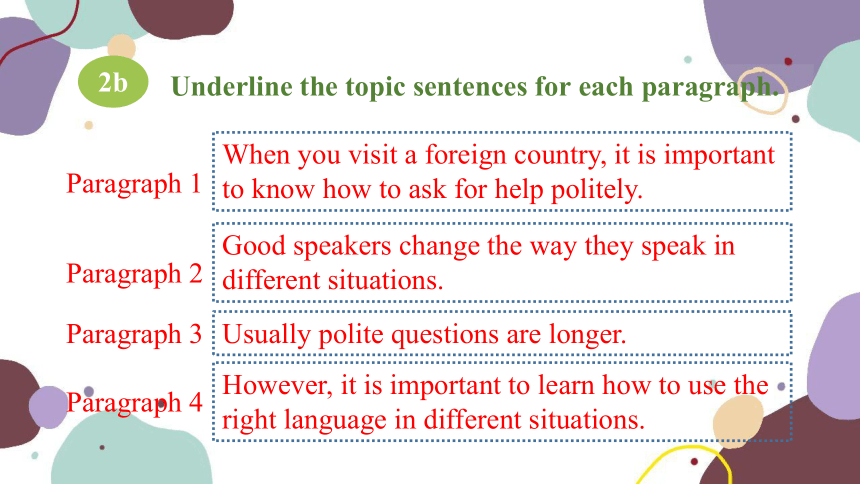
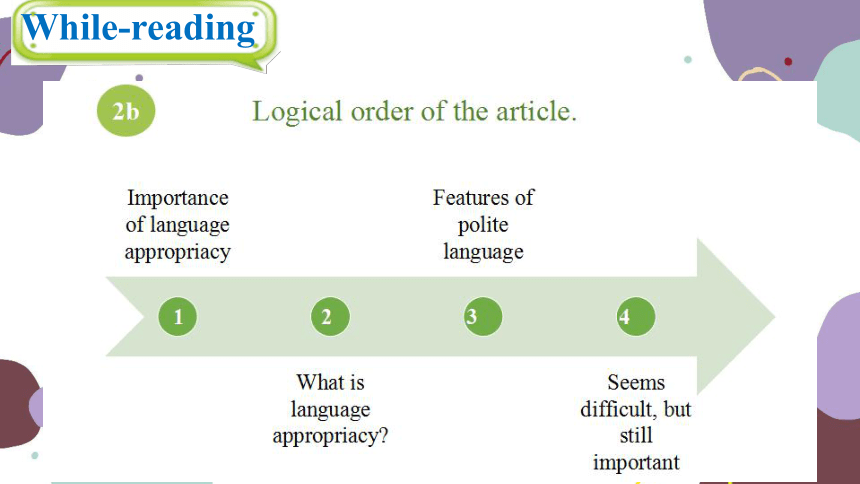
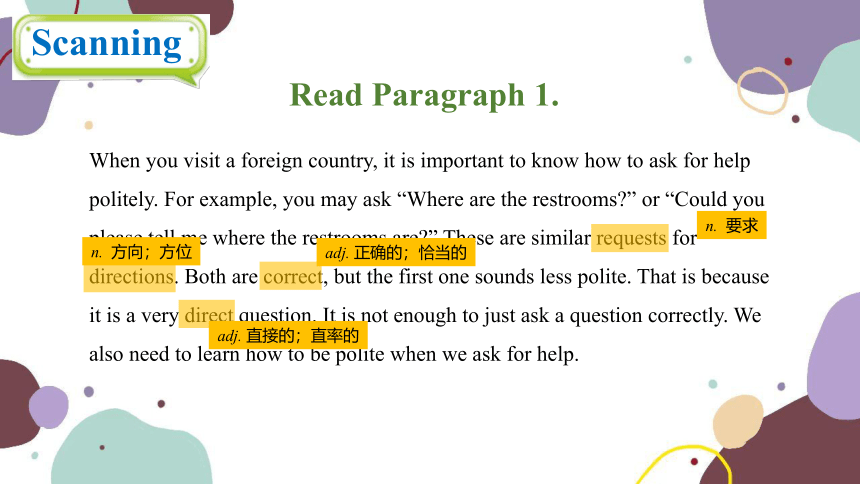
文档简介
(共32张PPT)
Unit 3
Could you please tell me where the restrooms are
第五课时 SectionB(2a~2d)
You are traveling in the USA. You want to mail a postcard to your best friend. So you want to know the way to the post office. How would you ask for the way
Warm-up
If you ask this way:
Where is the post office
Sorry. I can’t help you.
If you ask this way:
Pardon me, could you please tell me how I can get to the nearest post office
Sure. Go along this street, turn right at the second crossing, you can see it on your left.
USING SUITABLE LANGUAGE
In different situations, you need to choose and use suitable language based on cultural knowledge.
2a
Where do you need to make polite requests Think of some possible situations. Discuss them with your partner.
The places where you need to make polite requests:
In a foreign country.
In public places like a bank, a post office, a library,
a shopping mall, etc.
At school.
At home, especially when speaking to your elders.
…
Pre-reading
Look at the title and pictures, predict the passage.
Pardon me, could you please tell me where to park my car
Sure. There’s an underground parking lot over there.
Where is the post office
Sorry. I can’t help you.
Could you please……
Predict the passage. In your opinion, what’s the right
order of the following sentences
Use more words to help you sound more polite.
It is important to know how to make requests politely.
Good English speakers need to know how to speak politely.
The choice of language depends on the situation and the relationship
between the speakers.
adj. 礼貌的
adv. 礼貌地;客气地
Use more words to help you sound more polite.
It is important to know how to make requests politely.
Good English speakers need to know how to speak politely.
The choice of language depends on the situation and the relationship between the speakers.
Read the article quickly, order the sentences.
Underline the topic sentences for each paragraph.
2b
1
2
3
4
Skimmng
When you visit a foreign country, it is important to know how to ask for help politely.
Underline the topic sentences for each paragraph.
2b
Paragraph 1
Paragraph 2
Good speakers change the way they speak in different situations.
Paragraph 3
Usually polite questions are longer.
However, it is important to learn how to use the right language in different situations.
Paragraph 4
1
2
3
4
While-reading
Read Paragraph 1.
When you visit a foreign country, it is important to know how to ask for help politely. For example, you may ask “Where are the restrooms ” or “Could you please tell me where the restrooms are ” These are similar requests for directions. Both are correct, but the first one sounds less polite. That is because it is a very direct question. It is not enough to just ask a question correctly. We also need to learn how to be polite when we ask for help.
n. 要求
n. 方向;方位
adj. 直接的;直率的
adj. 正确的;恰当的
Scanning
Is it enough to speak correctly
No. It is not enough to just ask a question correctly. We also need to learn
how to be polite when we ask for help.
Then answer the question.
Read Paragraph 2.
Good speakers change the way they speak in different situations. The expressions they use might depend on whom they are speaking to or how well they know each other. It is all right to ask your classmates direct questions because you know them well. However, if you say to your teacher, “When is the school trip ”, this might sound impolite. But if you say, “Excuse me, Mr. West. Do you know when the school trip is ”, this will sound much more polite.
n.讲(某种语言)的人;发言者
pron. 谁;什么人
Is it necessary to ask all the people around you indirect questions
No.
It is all right to ask your classmates direct questions because you know them well.
Then answer the question.
Usually polite questions are longer. They include expressions such as “Could you please ... ” or “May I ask ... ” It sounds more polite to say, “Peter, could you please tell me your e-mail address ” than “Peter, tell me your e-mail address.” Sometimes we even need to spend time leading into a request. For example, we might first say to a stranger , “Excuse me, I wonder if you can help me” or “I’m sorry to trouble you, but ...” before asking for help.
Read Paragraph 3.
What are the features of polite language
Usually polite questions are longer. They include expressions such as “Could you please ... ” or “May I ask ... ”
Then answer the question.
It might seem more difficult to speak politely than directly. However, it is important to learn how to use the right language in different situations. This will help you communicate better with other people.
Read Paragraph 4 and the dialogue.
Pardon me, could you please tell me where to park my car
Sure. There’s an underground parking lot over there.
Where is the post office
Sorry. I can’t help you.
adj. 地下的;n. 地铁
停车场
In the second picture, why does the man say “Sorry, I can’t help you.” Can you change the question to a more polite one
Because the man is too impolite, he asks directly.
I may say…
Then answer the question.
Listen to the passage of 2b on Page 22, repeat. Pay attention to imitating the stress and intonation.
Listen and repeat.
Post-reading
Could you please…
It’s important to ask for help politely.(Para.1)
①Where are the restrooms less polite; direct
②Could you please tell me where the restrooms are
more polite
Change the way in different situation(Para. 2)
usually polite questions are longer(Para.3)
It’s important to learn how to use the right language in different situations.(Para.4)
①depend on whom they are speaking to or how well they know each other.
②ask your classmates direct questions; say to your teacher more politely
①Could you please… /May I ask… More polite
②Excuse me, I wonder if…/I’m sorry to trouble you, but…
①more difficult to speak politely than directly
②help you communicate better with other people
(1)request在此作名词,意为“要求;请求”。多指比较正式的请求,其后常接介词for,引出请求的具体内容。
They have made an urgent request for international aid.
1. These are similar requests for directions.
request /r kwest/ n.&v. 要求;请求
Point
Language points
(2)request还可作动词,意为“要求;请求”。常见用法有:
request sth. (from sb. ) (向某人)请求某事/某物
She requested permission to take part in the match.
request sb. (not) to do sth. 请求/要求某人(不要)做某事
The waiter requested me not to smoke in the restaurant.
request + that从句 要求...... 此时that从句要用虚拟语气,即从句谓语用“should+动词原形”,should可省略。
She requested that no one ( should) be late for the meeting.
correct在此作形容词,其同义词是right,反义词是incorrect“不正确的” ,其副词形式是correctly。
He gave a correct answer to the question.
If I remember correctly, he is Spanish.
correct还可作及物动词,意为“纠正,批改”。
It’s necessary to correct his mistakes.
He’s been correcting the kids’ homework for hours.
2. Both are correct, but the first one sounds less polite.
correct /k rekt/ adj. 正确的;恰当的
Point
(1)direct在此处作形容词,意为“直接的”。
I’m not in direct contact with them.
(2)direct作形容词,还可意为“直率的”。
He is very direct, so you always know what his real views are.
3. That is because it is a very direct question.
direct /d rekt/ adj. 直接的;直率的
Point
2c
Find the direct questions and polite requests from the passage.
Direct questions Polite requests
1. 1.
2. 2.
3. 3.
4.
Where are the restrooms
When is the school trip
Where’s the post office
Could you please tell me where
the restrooms are
Excuse me, Mr. West. Do you know when the school trip is
Peter, could you please tell me your e-mail address
Pardon me, could you please tell me where to park my car
Post-reading
Request Person Place
1.Will you pass the salt
2. Do you know where I can change some money, please
3. Could you tell me what just happened
4. Can you please tell me where the nearest station is
5. Excuse me, do you know what time it begins, please
6.Let me know when you’re ready, OK
7.Could you possibly tell me the way to the village school
2d
Read the requests below. In the second column, write A if you would say it to someone you know and B if you would say it to a stranger. In the last column, write where you think the people are talking.
A
restaurant/home
B
street
any public place/home
A/B
B
street
B
movie theatre/center hall
A
home
B
street
I. 根据2b短文选词填空
It is not enough to just ask a question (1) _________. We also need to learn how to
be polite when we ask for help.
(2) _________ speakers change the way they speak in different situations. The
expressions they use might depend on whom they are speaking to or how (3) _______
they know each other. For example, it is all right to ask your classmates (4) _________
questions. But it will sound (5) __________ to ask your teachers direct questions.
Good
correctly
important direct difficult good correctly longer impolite well
well
direct
impolite
Exercises
Polite questions are usually (6) __________ and sometimes they sound like a kind
of request. It seems (7) __________ to speak politely, but it is very (8)__________
to learn how to use the right language in different situations.
difficult
longer
important direct difficult good correctly longer impolite well
important
II. 单项选择
Allen always behaves ________, so many people like him.
A. easily B. friendly C. politely D. lively
2. — With _____ does he live
— He lives with his sister in a small house.
A. who B. where C. whom D. what
3. All the students are requested _______ the school celebration.
A. attend B. to attend C. attending D. attended
C
C
B
Summary
Homework
1. Read the passage in 2b.
2. Make sentences with the useful expressions: parking lot, that is because…, request sb. (not) to do sth. , a request for
Unit 3
Could you please tell me where the restrooms are
第五课时 SectionB(2a~2d)
You are traveling in the USA. You want to mail a postcard to your best friend. So you want to know the way to the post office. How would you ask for the way
Warm-up
If you ask this way:
Where is the post office
Sorry. I can’t help you.
If you ask this way:
Pardon me, could you please tell me how I can get to the nearest post office
Sure. Go along this street, turn right at the second crossing, you can see it on your left.
USING SUITABLE LANGUAGE
In different situations, you need to choose and use suitable language based on cultural knowledge.
2a
Where do you need to make polite requests Think of some possible situations. Discuss them with your partner.
The places where you need to make polite requests:
In a foreign country.
In public places like a bank, a post office, a library,
a shopping mall, etc.
At school.
At home, especially when speaking to your elders.
…
Pre-reading
Look at the title and pictures, predict the passage.
Pardon me, could you please tell me where to park my car
Sure. There’s an underground parking lot over there.
Where is the post office
Sorry. I can’t help you.
Could you please……
Predict the passage. In your opinion, what’s the right
order of the following sentences
Use more words to help you sound more polite.
It is important to know how to make requests politely.
Good English speakers need to know how to speak politely.
The choice of language depends on the situation and the relationship
between the speakers.
adj. 礼貌的
adv. 礼貌地;客气地
Use more words to help you sound more polite.
It is important to know how to make requests politely.
Good English speakers need to know how to speak politely.
The choice of language depends on the situation and the relationship between the speakers.
Read the article quickly, order the sentences.
Underline the topic sentences for each paragraph.
2b
1
2
3
4
Skimmng
When you visit a foreign country, it is important to know how to ask for help politely.
Underline the topic sentences for each paragraph.
2b
Paragraph 1
Paragraph 2
Good speakers change the way they speak in different situations.
Paragraph 3
Usually polite questions are longer.
However, it is important to learn how to use the right language in different situations.
Paragraph 4
1
2
3
4
While-reading
Read Paragraph 1.
When you visit a foreign country, it is important to know how to ask for help politely. For example, you may ask “Where are the restrooms ” or “Could you please tell me where the restrooms are ” These are similar requests for directions. Both are correct, but the first one sounds less polite. That is because it is a very direct question. It is not enough to just ask a question correctly. We also need to learn how to be polite when we ask for help.
n. 要求
n. 方向;方位
adj. 直接的;直率的
adj. 正确的;恰当的
Scanning
Is it enough to speak correctly
No. It is not enough to just ask a question correctly. We also need to learn
how to be polite when we ask for help.
Then answer the question.
Read Paragraph 2.
Good speakers change the way they speak in different situations. The expressions they use might depend on whom they are speaking to or how well they know each other. It is all right to ask your classmates direct questions because you know them well. However, if you say to your teacher, “When is the school trip ”, this might sound impolite. But if you say, “Excuse me, Mr. West. Do you know when the school trip is ”, this will sound much more polite.
n.讲(某种语言)的人;发言者
pron. 谁;什么人
Is it necessary to ask all the people around you indirect questions
No.
It is all right to ask your classmates direct questions because you know them well.
Then answer the question.
Usually polite questions are longer. They include expressions such as “Could you please ... ” or “May I ask ... ” It sounds more polite to say, “Peter, could you please tell me your e-mail address ” than “Peter, tell me your e-mail address.” Sometimes we even need to spend time leading into a request. For example, we might first say to a stranger , “Excuse me, I wonder if you can help me” or “I’m sorry to trouble you, but ...” before asking for help.
Read Paragraph 3.
What are the features of polite language
Usually polite questions are longer. They include expressions such as “Could you please ... ” or “May I ask ... ”
Then answer the question.
It might seem more difficult to speak politely than directly. However, it is important to learn how to use the right language in different situations. This will help you communicate better with other people.
Read Paragraph 4 and the dialogue.
Pardon me, could you please tell me where to park my car
Sure. There’s an underground parking lot over there.
Where is the post office
Sorry. I can’t help you.
adj. 地下的;n. 地铁
停车场
In the second picture, why does the man say “Sorry, I can’t help you.” Can you change the question to a more polite one
Because the man is too impolite, he asks directly.
I may say…
Then answer the question.
Listen to the passage of 2b on Page 22, repeat. Pay attention to imitating the stress and intonation.
Listen and repeat.
Post-reading
Could you please…
It’s important to ask for help politely.(Para.1)
①Where are the restrooms less polite; direct
②Could you please tell me where the restrooms are
more polite
Change the way in different situation(Para. 2)
usually polite questions are longer(Para.3)
It’s important to learn how to use the right language in different situations.(Para.4)
①depend on whom they are speaking to or how well they know each other.
②ask your classmates direct questions; say to your teacher more politely
①Could you please… /May I ask… More polite
②Excuse me, I wonder if…/I’m sorry to trouble you, but…
①more difficult to speak politely than directly
②help you communicate better with other people
(1)request在此作名词,意为“要求;请求”。多指比较正式的请求,其后常接介词for,引出请求的具体内容。
They have made an urgent request for international aid.
1. These are similar requests for directions.
request /r kwest/ n.&v. 要求;请求
Point
Language points
(2)request还可作动词,意为“要求;请求”。常见用法有:
request sth. (from sb. ) (向某人)请求某事/某物
She requested permission to take part in the match.
request sb. (not) to do sth. 请求/要求某人(不要)做某事
The waiter requested me not to smoke in the restaurant.
request + that从句 要求...... 此时that从句要用虚拟语气,即从句谓语用“should+动词原形”,should可省略。
She requested that no one ( should) be late for the meeting.
correct在此作形容词,其同义词是right,反义词是incorrect“不正确的” ,其副词形式是correctly。
He gave a correct answer to the question.
If I remember correctly, he is Spanish.
correct还可作及物动词,意为“纠正,批改”。
It’s necessary to correct his mistakes.
He’s been correcting the kids’ homework for hours.
2. Both are correct, but the first one sounds less polite.
correct /k rekt/ adj. 正确的;恰当的
Point
(1)direct在此处作形容词,意为“直接的”。
I’m not in direct contact with them.
(2)direct作形容词,还可意为“直率的”。
He is very direct, so you always know what his real views are.
3. That is because it is a very direct question.
direct /d rekt/ adj. 直接的;直率的
Point
2c
Find the direct questions and polite requests from the passage.
Direct questions Polite requests
1. 1.
2. 2.
3. 3.
4.
Where are the restrooms
When is the school trip
Where’s the post office
Could you please tell me where
the restrooms are
Excuse me, Mr. West. Do you know when the school trip is
Peter, could you please tell me your e-mail address
Pardon me, could you please tell me where to park my car
Post-reading
Request Person Place
1.Will you pass the salt
2. Do you know where I can change some money, please
3. Could you tell me what just happened
4. Can you please tell me where the nearest station is
5. Excuse me, do you know what time it begins, please
6.Let me know when you’re ready, OK
7.Could you possibly tell me the way to the village school
2d
Read the requests below. In the second column, write A if you would say it to someone you know and B if you would say it to a stranger. In the last column, write where you think the people are talking.
A
restaurant/home
B
street
any public place/home
A/B
B
street
B
movie theatre/center hall
A
home
B
street
I. 根据2b短文选词填空
It is not enough to just ask a question (1) _________. We also need to learn how to
be polite when we ask for help.
(2) _________ speakers change the way they speak in different situations. The
expressions they use might depend on whom they are speaking to or how (3) _______
they know each other. For example, it is all right to ask your classmates (4) _________
questions. But it will sound (5) __________ to ask your teachers direct questions.
Good
correctly
important direct difficult good correctly longer impolite well
well
direct
impolite
Exercises
Polite questions are usually (6) __________ and sometimes they sound like a kind
of request. It seems (7) __________ to speak politely, but it is very (8)__________
to learn how to use the right language in different situations.
difficult
longer
important direct difficult good correctly longer impolite well
important
II. 单项选择
Allen always behaves ________, so many people like him.
A. easily B. friendly C. politely D. lively
2. — With _____ does he live
— He lives with his sister in a small house.
A. who B. where C. whom D. what
3. All the students are requested _______ the school celebration.
A. attend B. to attend C. attending D. attended
C
C
B
Summary
Homework
1. Read the passage in 2b.
2. Make sentences with the useful expressions: parking lot, that is because…, request sb. (not) to do sth. , a request for
同课章节目录
- Unit 1 How can we become good learners.
- Section A
- Section B
- Unit 2 I think that mooncakes are delicious!
- Section A
- Section B
- Unit 3 Could you please tell me where the restroom
- Section A
- Section B
- Unit 4 I used to be afraid of the dark.
- Section A
- Section B
- Unit 5 What are the shirts made of?
- Section A
- Section B
- Review of Units 1-5
- Unit 6 When was it invented?
- Section A
- Section B
- Unit 7 Teenagers should be allowed to choose their
- Section A
- Section B
- Unit 8 It must belong to Carla.
- Section A
- Section B
- Unit 9 I like music that I can dance to.
- Section A
- Section B
- Unit 10 You're supposed to shake hands.
- Section A
- Section B
- Review of Units 6-10
- Unit 11 Sad movies make me cry.
- Section A
- Section B
- Unit 12 Life is full of the unexpected
- Section A
- Section B
- Unit 13 We're trying to save the earth!
- Section A
- Section B
- Unit 14 I remember meeting all of you in Grade 7.
- Section A
- Section B
- Review of Units 11-14
